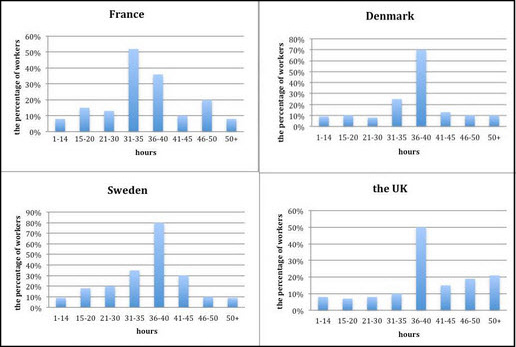Đề thi IELTS Writing 28/3/2015
Đề thi IELTS Writing 28/3/2015
Đề thi IELTS Writing 28/3/2015 cũng như những đề thi viết IELTS khác gồm 2 câu hỏi task, thí sinh sẽ viết quan điểm của mình về 2 sự việc đó. Đề thi IELTS Writing có đáp án tham khảo đi kèm, giúp các bạn ôn luyện chủ động và linh hoạt nhất. Mời các bạn tham khảo.
Task 1: The charts below show the number of working hours per week in industrial sector in four European countries in 2002.

Task 2: Some people think that the increasing use of computers and mobile phones in communication has had negative effect on young people’s reading and writing skills. To what extend, do you agree or disagree with this statement?
Đáp án tham khảo đề thi IELTS Writing 28/3/2015
Task 1:
The bar chart give some information about how long the people worked each week in France, Denmak, Sweden and the UK in the year of 2002.
In France, more than half of the workers for 31 to 35 hours per week. The percentage of people who worked for 36 - 40 hours and 46 - 50 hours was 35% and 20% respectively. And the figure for the rest working hours accounted for around 10%. Denmark and Sweden witnessed the highest proportion of people working for 36-40 hours, which was quite different from that in France. The second and the third place came from 31 - 35 hours and 41 - 45 hours (25% and 12% in Denmark; 35% and 30% in Sweden). Additionally, the proportion of people who worked for less for more hours in Denmark was higher that in Sweden.
When it come to tire UK, it is interesting to not that as the working hours increased, the proportion seemed to be higher, except the figure for 36 - 40% hours. 50% of the British people's working hours lasted for 36 - 40 hours.
Overall, France was the country where poeple worked for the least hours, while the Swadish spent the most time on work among the people from four different countries.
Task 2:
Some educators have warned that the prevalence of mobile phones and the internet has a negative effect on adolescent's academic ability. I agree with this view. Firstly, the wide use of 'Internet Eglish' is regarded as the culprit of the declining writing skills. One obvious reason is that young adults may make some grammatical mistakes inconsciously because of the frequent use of improper abbreviations and punctuation on mobile devices, and this might pose a threat to their future career where a professional writing ability is required in most companies. Therefore, many linguists have expressed their concerns that the instant messaging and chatting on mobile phones might harm the ability of using formal written English.
Secondly, the poor reading proficiency can be put down to the frequent use of technologies as well. Compared to the older generation, young people today are cluttered with different gadgets, like iPad and Iphone. For instance, with easy access to wifi, they can surf the internet anywhere and anytime to follow the latest information of their idols in another country. However, most social networks deliver fragment and useless information, which not only steals time away from solitary reading but also undermine the ability to think independently, In my opinion, this phenomenon should be reversed as soon as possible because reading has a profound effect on a nation's future. In conclusion, while these electronic divices make the communication much more convenient, I am in the camp that they might affect young people's academic performance negatively.


